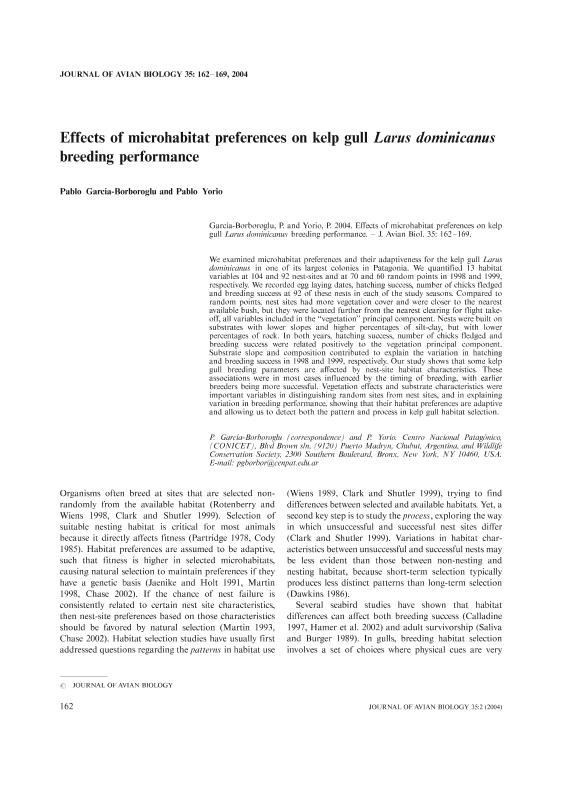Mostrar el registro sencillo del ítem
dc.contributor.author
Garcia Borboroglu, Jorge Pablo

dc.contributor.author
Yorio, Pablo Martin

dc.date.available
2020-05-05T20:21:38Z
dc.date.issued
2004-02
dc.identifier.citation
Garcia Borboroglu, Jorge Pablo; Yorio, Pablo Martin; Effects of microhabitat preferences on kelp gull Larus dominicanus breeding performance; Wiley Blackwell Publishing, Inc; Journal Of Avian Biology; 35; 2; 2-2004; 162-169
dc.identifier.issn
0908-8857
dc.identifier.uri
http://hdl.handle.net/11336/104291
dc.description.abstract
We examined microhabitat preferences and their adaptiveness for the kelp gull Larus dominicanus in one of its largest colonies in Patagonia. We quantified 13 habitat variables at 104 and 92 nest-sites and at 70 and 60 random points in 1998 and 1999, respectively. We recorded egg laying dates, hatching success, number of chicks fledged and breeding success at 92 of these nests in each of the study seasons. Compared to random points, nest sites had more vegetation cover and were closer to the nearest available bush, but they were located further from the nearest clearing for flight takeoff, all variables included in the ‘‘vegetation’’ principal component. Nests were built on substrates with lower slopes and higher percentages of silt-clay, but with lower percentages of rock. In both years, hatching success, number of chicks fledged and breeding success were related positively to the vegetation principal component. Substrate slope and composition contributed to explain the variation in hatching and breeding success in 1998 and 1999, respectively. Our study shows that some kelp gull breeding parameters are affected by nest-site habitat characteristics. These associations were in most cases influenced by the timing of breeding, with earlier breeders being more successful. Vegetation effects and substrate characteristics were important variables in distinguishing random sites from nest sites, and in explaining variation in breeding performance, showing that their habitat preferences are adaptive and allowing us to detect both the pattern and process in kelp gull habitat selection.
dc.format
application/pdf
dc.language.iso
eng
dc.publisher
Wiley Blackwell Publishing, Inc

dc.rights
info:eu-repo/semantics/openAccess
dc.rights.uri
https://creativecommons.org/licenses/by-nc-sa/2.5/ar/
dc.subject
habitat selection
dc.subject
breeding performance
dc.subject
larus dominicanus
dc.subject
Patagonia, Argentina
dc.subject.classification
Ecología

dc.subject.classification
Ciencias Biológicas

dc.subject.classification
CIENCIAS NATURALES Y EXACTAS

dc.title
Effects of microhabitat preferences on kelp gull Larus dominicanus breeding performance
dc.type
info:eu-repo/semantics/article
dc.type
info:ar-repo/semantics/artículo
dc.type
info:eu-repo/semantics/publishedVersion
dc.date.updated
2020-04-27T14:43:47Z
dc.identifier.eissn
1600-048X
dc.journal.volume
35
dc.journal.number
2
dc.journal.pagination
162-169
dc.journal.pais
Reino Unido

dc.journal.ciudad
Londres
dc.description.fil
Fil: Garcia Borboroglu, Jorge Pablo. Consejo Nacional de Investigaciones Científicas y Técnicas. Centro Científico Tecnológico Conicet - Centro Nacional Patagónico; Argentina
dc.description.fil
Fil: Yorio, Pablo Martin. Consejo Nacional de Investigaciones Científicas y Técnicas. Centro Científico Tecnológico Conicet - Centro Nacional Patagónico; Argentina
dc.journal.title
Journal Of Avian Biology

dc.relation.alternativeid
info:eu-repo/semantics/altIdentifier/url/https://onlinelibrary.wiley.com/doi/10.1111/j.0908-8857.2004.03149.x
dc.relation.alternativeid
info:eu-repo/semantics/altIdentifier/doi/http://dx.doi.org/10.1111/j.0908-8857.2004.03149.x
Archivos asociados
